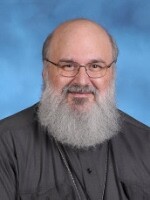A number of years ago, at a parent’s night held at the school where I taught theology to junior high students, a parent asked a question no one had ever asked me before: “Who has been the greatest influence on your spiritual life?” I remember responding without missing a beat: “Thomas Merton.”
Thomas Merton was born in Prades, France in 1915. By the age of sixteen, Merton had lost both parents and began a life of a wanderer and spiritual pilgrim. He searched and struggled for meaning and guidance in his life, eventually finding a home and family as a priest-monk of the Trappist order at the Abbey of Gethsemane in Kentucky. Twenty-seven years to the day he entered his religious order, Merton died of accidental electrocution in Bangkok, Thailand while attending a meeting of Christian and Buddhist monks. During his lifetime, Thomas Merton wrote a best-selling autobiography (The Seven Storey Mountain), books on spirituality, on issues such as racism, peace, war, social justice, abuse of technology, poetry, essays, Eastern religion and book reviews. Recently, five volumes of his letters have been published, as well as seven volumes of his journals. Whatever he wrote enabled him to engage the world in its search for God, for meaning in life, for the individual’s “true self,” the self that God wishes to embrace, the self that the blood of Jesus redeemed.
The theme for this month is “Sin,” not everyone’s favorite subject, and, I believe, a particular sore spot for gay folk. Not that we are sinners more than anyone else, but to many people, our very being is sinful. So what does Merton have to do with sin and with us?
In his small book Life and Holiness, Merton gave my favorite definition of sin:
“Sin is the refusal to be what we were created to be — (children) of God, images of God. Ultimately sin, while seeming to be an assertion of freedom, is a flight from the freedom and responsibility of divine (childhood).”
The word “sin” literally means “to miss the mark.” And the mark we miss when we abandon ourselves to the allure of sin is our true self. Merton wrote often about the battle between the “false self” we so often hide behind to shield ourselves from pain and painful truths, and the “true self,” the self God created for union with himself.
In New Seeds of Contemplation, Merton wrote,
“All sin starts with the assumption that my false self, the self that exists only in my egocentric desires, is the fundamental reality of life to which everything else in the universe is ordered.”
So if sin has its roots in the false self, where do I find who I really am? Again from New Seeds of Contemplation:
“The secret of my identity is hidden in the love and mercy of God…If I find him I will find myself and if I find my true self I will find him…The only one who can teach me to find God is God himself, alone. “
Sin is an unfortunate aspect of the human condition. The excuse, “Hey, I’m only human,” does not allow us to give free reign to sin. Sin does not make us more human. It robs us of humanity and keeps the Kingdom of God from flourishing around us.
Gay and lesbian people, contrary to the warped opinion of our Bible-slinging, self-righteous brothers and sisters who spew forth their hatred and fear, were not created as lesser people, intended to be second-class members of our respective churches. No, as Merton reminds us, we were created to be God’s children, people gifted with, among other things, a sexuality that can, when lived in truth and integrity, draw is deeper into loving unity with our Creator and faithfulness toward our brothers and sisters.
Being human, gay and lesbian people are tempted to put on the masks of falsity and embrace greed, lust, hatred and selfishness like anyone else. But we can also fall victim to some sins others may not so easily be touched by. There is the sin of self-loathing, by which we help our oppressors strip away our healthy sense of self and dignity. There is also the sin of defining ourselves with the definitions imposed on us by others. “Homophobia” is often not the culprit we must do battle with, it is rather, “homohatred.” Dealing with someone’s fear is one thing, their hatred is another, and it is self-hatred, nurtured in the rancid garden of “fag,” “queer,” “faggot,” and “homo,” that causes too many of our sisters and brothers to take their lives because they could not see themselves as the precious children of God they were.
If we wish to find ourselves, to regain the truth of our existence and our being, let us turn from the lie of sin. Let us, instead, turn in trust to the God who created us, who gave us all our gifts, including the blessing of our sexuality. Let us turn and receive the undying embrace of Jesus our Savior, Brother and Lover, to whom no sacrifice on our behalf was too great, even the shedding of his blood. And let us turn to the Holy Spirit, whose light and warmth chases away the darkness and cold of sin and enables us to once more recognize ourselves as we really are, submerged in the Trinity of love, compassion and boundless mercy.

Tom Yeshua is the pen name of Thomas E.L. Cloutier OFS, a transitional deacon who taught theology for 30 years at Nashua (N.H.) Catholic Regional Junior High School. He earned a bachelor’s degree from Don Bosco College in Newton, N.J., and a master’s in divinity and theology from St. John’s Seminary in Brighton, Mass.
